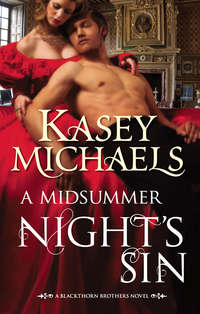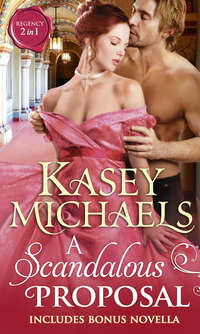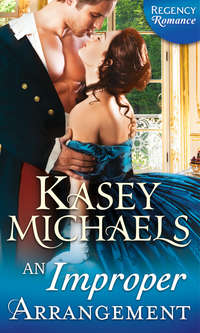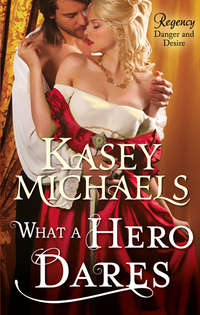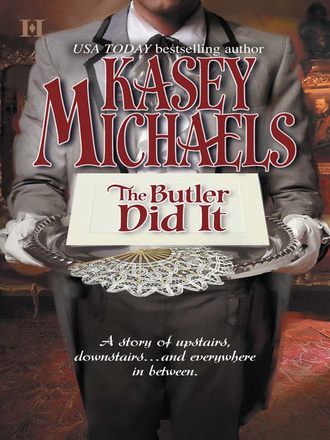
Полная версия
The Butler Did It

PRAISE FOR
KASEY MICHAELS
“Using wit and romance with a master’s skill, Kasey Michaels aims for the heart and never misses.”
—New York Times bestselling author Nora Roberts
“Kasey Michaels creates characters who stick with you long after her wonderful stories are told.”
—New York Times bestselling author Kay Hooper
“If you want emotion, humor and characters you can love, you want a story by Kasey Michaels.”
—national bestselling author Joan Hohl
“Sparkling with Michaels’s characteristically droll repartee and lovable lead characters, this Regency-set romance enchants with its skillful treatment of a familiar formula.”
—Publishers Weekly on Someone To Love
“Michaels demonstrates her flair for creating likable protagonists who possess chemistry, charm and a penchant for getting into trouble. In addition, her dialogue and descriptions are full of humor….”
—Publishers Weekly on This Must Be Love
KASEY MICHAELS
The Butler Did It

To Michelle Van Norman Tirpak.
Always missed, forever loved.
Contents
One, Two, Three, Etcetera…
They Gather Here Together…
An Evening at Almack’s
Mayfair Madness
At The Ball…
And Now, Good Night…
One, Two, Three, Etcetera…
As I was going to St. Ives,
I met a man with seven wives,
Each wife had seven sacks,
Each sack had seven cats,
Each cat had seven kits:
Kits, cats, sacks, and wives,
How many were there going to St. Ives?
—Anonymous
TO BEGIN WITH ONCE UPON A TIME would be, perhaps, a tad facetious. Rather to simply begin at the beginning, or at least as nearly as possible to that part of the beginning where it becomes interesting.
Picture England during the Regency. Such a time, such a varied generation. War, civil upheaval, opulence, indulgence, genius and cruelty. Great literature, great inventions, great deeds, great injustices. The English Regency has all of that.
Those who live there, happily, also manage to squeeze in a little silliness, a little fun. There are a few, in particular, who might be mentioned now.
Who are these people?
Why not commence with Morgan Drummond, Marquis of Westham, a gentleman who has been blessed with fine good looks, great wealth and high intelligence…and cursed with a quick temper that, five years earlier, ended in a duel that nearly cost another man his life.
Shameful.
And Morgan was ashamed, devastated by his actions. What was the matter with him? he asked himself. Did an insult to his latest light-o’-love (what was her name again?) really necessitate a trip to Lincolns Inn Fields and dueling foils drawn at dawn?
Was he that mad? Hadn’t he learned anything through his father’s death at the hands of another duelist when he, Morgan, had been only a toddler in leading strings? What had that fight been about anyway? If Morgan couldn’t recall the story, and he was the son of “Mad Harry,” obviously the reason had been insufficient to the result—his mother a widow, his father’s body moldering in the family mausoleum at Westham.
What he did know was that he did not wish his epitaph to read: “Mad Morgan, laid low by his own wretched temper.”
So the chastened and repentant Morgan swore to shun his former hey-go-mad ways and had fled London, retreating to his estate in Westham, to lick his own wounds and examine his life.
And he had been exceedingly boring.
He had drunk deep and long, then thought, hard and long, and finally decided that he could control his temper. He worked diligently during those five years of self-imposed isolation, remaking himself less in his father’s image and more in what he believed to be his own. He did not, however, metamorphose into Mellow Morgan, as he never quite overcame his inborn arrogance, his penchant for sarcasm, or his most definite disdain for fools.
Alas, ho-hum, he was still boring.
But at last Morgan, having just passed his thirtieth birthday, and admittedly weary of his reclusive life, believes himself equipped to rejoin civilization once more. Sure of himself, confident in his self-control, he even feels prepared to bear the silliness of a London Season, because yes, indeed, it is time Morgan marries and sets up his nursery, begets himself an heir to carry on the line.
He has thought long and hard (and boringly) about this as well. What he needs is a complacent wife, a calm and never ruffled wife, a woman of breeding and some wit, but with a temper as sweet as a May morning—for the sake of their unborn children, naturally.
So off he goes, to London.
NEXT UP, WE HAVE ONE Miss Emma Clifford who, as it happens, is also on her way to London.
Dear Emma. Was there ever a more beautiful female?
Poor Emma. Was there ever a more beleaguered female?
Emma Clifford is the older child and keeper of the Clifford family, which explains the beleaguered portion of her description.
Emma’s mother is lovable, but a bit of a twit. Her brother is a complete loss. Her irascible grandmother is forever reliving her not quite proper past. And they’re all constantly in need of funds.
The Cliffords do have one hope. Actually, they harbor quite a few hopes. Emma, however, has just one. She is not a silly girl; she knows she is quite beautiful. And, in London, beautiful is often the key that opens the door to an advantageous marriage.
In other words, a good marriage equaled solvency for the entire family. Ah, a financially comfortable existence; always considered A Good Thing To Have, and eternally prized as a cure-all to any woe by Those Who Don’t Have.
Although her grandmother keeps telling Emma that, ideally, marriage shouldn’t have anything to do with lining one’s pocket at the expense of being stuck with a belching, scratching buffoon who probably ingests cabbage for breakfast.
Her grandmother’s advice to one side, the determined Emma has sold her mother’s diamonds, hocked the family portraits, and traded the services of a fairly good stud horse for the use of an ancient traveling coach and some showy if not quite prime carriage horses.
So the Cliffords, like Morgan Drummond, are off to London for the Season. In the Cliffords’ case, it is to cut a dash, to shop the marriage mart (already the marquis and the questing young miss have something in common), to trade on Mama’s grasstime friendship with Lady Sally Jersey in order to secure vouchers to Almack’s, and be introduced to the Very Cream of Society.
Daphne Clifford, Emma’s mother, can barely contain herself. Daphne, never to be spoken of as The Widow Clifford, is a faded beauty, yet still quite attractive. The years have brought a few lines, a few extra pounds…and not a whit more intelligence than when, a quarter century earlier, she’d tossed herself away on the handsome spendthrift, Samuel Clifford.
She agrees that dearest Emma should find herself a wealthy husband. She sees no reason why such a beautiful girl should have the least trouble in Snatching Up the Catch of the Season. Daphne certainly doesn’t expect any difficulties in her own quest for—ta-da!—True Love.
Daphne does quite a bit of her thinking in capitals.
Fanny Clifford scoffs at her daughter-in-law’s hopes, which she considers as likely to be fulfilled as Daphne’s wish to have Mother Clifford retire to Bath with her elderly cousin Maude, and For Goodness’ Sakes Leave Everyone Alone.
Fanny is a trifle…well, it could be said that she is very much her own woman. She lived a different London life than debutantes coming to town during the namby-pamby and oh, so proper Regency. A product of a freer, bawdier age, Fanny speaks frankly, behaves just as she wishes, and believes missish girls and milksop gentlemen should be locked up somewhere so that the world shouldn’t have to wince as they mince.
Fanny’s hoping for adventure in London, not a wedding ring. After all, she’d been married, and doesn’t quite see the appeal of being legally bracketed to another man who could very well gnaw at his toenails in bed.
Definitely unknown to her granddaughter, Fanny has big plans. Or as Daphne might think it: Big Plans. Besides having herself a little fun before she’s too aged to recognize fun even if it toddled up and pinched her on the bottom, she has conjured up a plan to convince at least one of her old lovers to offer up a solvent, handsome, hopefully appealing grandson to wed Emma.
One thing Fanny knows for certain is that she will not, for any amount of money, for the possibility of any grand title, allow her dear Emma to wed anyone in the least like her grandson.
Clifford Clifford (Daphne had so little imagination), better known as Cliff, is younger than Emma, still two years shy of reaching his majority, but he is old enough to believe he, too, can go cut himself a dash in London Society.
To Cliff, this means attendance at mills, bearbaitings, cockfights, and visits to any gaming hell where green-as-grass country bumpkins can be assured that they will leave the establishment with empty pockets.
In short, in long, Cliff Clifford is the sort of knock-headed young fool Morgan Drummond could never learn to suffer gladly, even if he had remained at his estate until his blood had cooled enough to form ice chips in his veins.
Also traveling to London this Season is one Edgar Marmon, Adventurer.
Not to put too fine a point on it, Edgar used to be an Adventurer. Now, at the ripe old age of seventy, he thinks he’s an Adventurer. A man who lives by his wits, and the lack of wits of his victims, the man has run many a rig, usually unsuccessfully, and has more than a few enemies he hopes are older, and slower, and cannot outrun him.
Edgar is coming to London with a Grand Idea. A Brilliant Scheme. A Grand Plan sure to line his pockets one last time so that he can retire to Brighton or some such comfortable spot, and prey on rich widows at his leisure.
Oh dear, someone else who thinks in capitals.
At the moment, Edgar is masquerading as Sir Edgar Marmington, inventor and gentleman…a man who really, really discourages investors from believing they’ll become even more wealthy than they were by lining his pockets with blunt for the privilege of coming in on the ground floor, as it were, of his most ambitious invention to date: converting lead to gold.
Of course Edgar discourages investors. And pretty pink pigs are frequently observed orbiting around Parliament in the noonday sun.
Already in London but hoping for a change of address is one Mrs. Olive Norbert, the “Mrs.” being a courtesy title, although no one numbered in Olive’s former acquaintance had found it necessary to live within any such rules of courtesy.
Olive is a seamstress of two and fifty, now happily retired, who has even more happily come into a moderate fortune by way of an inheritance from her last client, a fairly dotty woman who dearly loved clothing and definitely disliked her relatives.
With no plans to marry, even if someone should ask, Olive is intent only on looking at London through a different window than the small, dusty one in the single cramped attic room she’d inhabited above her former employer’s shop in one of the less fashionable neighborhoods just outside Mayfair.
In short, Olive, newly solvent, is intent on having herself a small holiday. Right smack in the center of London Society.
She knows she’ll have a splendid time. After all, she’s psychic. How else would she have known that Mrs. Hartford would perish in a nasty fall down the stairs and leave her seamstress five thousand pounds?
As Daphne would have said: Mrs. Norbert Could Be Trouble.
Perry Shepherd, the Earl of Brentwood, has already been “trouble” to Morgan Drummond. His lordship had been one of the marquis’s chums in school, and during his one Season in London. Right up until the moment, as a matter of fact, that the marquis had challenged him to that infamous duel over the affections of a comely young Covent Garden dancer (What was her name?).
Yet, the duel to one side, the earl still likes the marquis. Really. After all, the scar on his cheek is actually rather dashing. The ladies seem to fancy it, and the earl certainly fancies the ladies, so he’s rather well pleased with the whole thing, even if the scar gives his valet the very devil when he shaves him.
Perry also would be happy to take up his friendship with Morgan once more when that man returns to London, sort of help ease the man’s way back into Society. Besides, London has been sadly flat without Morgan there to comment on the foolishness and frailties of the ton and, as Perry well knows, where Morgan goes, it is many things, but it is never, never dull.
Yes, the earl will call on his friend Morgan as soon as he learns that the man has arrived at his home in London.
There is a staff in residence year-round at the marquis’s Grosvenor Square mansion in Mayfair.
Mrs. Hazel Timon, for one, is housekeeper of the marquis’s London domicile. But not for long, as she has a nice little nest egg growing in the trunk at the bottom of her closet.
Mrs. Timon rides herd on Claramae, the young, comely but vacant-headed maid of all work on the skeleton staff. Claramae also acts as ladies’ maid when needed, and spends as much time as possible flirting with the rascally Riley.
Footman, under-butler, groom, coachie, Riley does whatever is needed. He’s happy to be of service. This is obvious by the way his hand is always out whenever he is of service.
The Grosvenor Square staff being quite small in the absence of its owner, that leaves just one more servant: the estimable, and quite inventive Thornley.
For years, Thornley has played the role of butler to the Drummond family, father and son.
He is loyal. He is as proper as one can get without having an actual pole thrust up one’s…suffice it to say, he’s quite proper.
Thornley is two more things. He is ambitious, and he is a practical sort who can’t abide waste.
Thornley rules the mansion as butler, as majordomo, as the most important, elevated servant, during good times and bad, including the past five long years, while the young master sulked in the country and the London mansion stood empty.
But ruling a skeleton staff that does little more than occasionally polish some silver and swipe cobwebs from the corners, while eating their heads off, is not much of a challenge for the man.
At least it wasn’t. For the first two Seasons the mansion stood empty as the city came to life from late March through the King’s birthday.
For the past three Seasons, including this one, Thornley, acting on his own initiative, has found a way to keep the staff busy. He has been leasing rooms in the mansion to those who need accommodations while in town for the festivities.
Because a house, even a London mansion, needs people. Needs life.
And the profits aren’t too shabby, either.
SO, HOW MANY WERE THERE going to Saint Ives…er, who all will be gathering at that Grosvenor Square mansion? Ticking them off on one’s fingers would get:
One small but inventive staff.
One Interesting Family.
One old friend.
One slightly illegal adventurer.
One possible killer.
Lastly, arriving late and without notice, one dedicatedly mild-tempered Marquis of Westham.
Perhaps he should have sent a note….
They Gather Here Together…
If possible honestly, if not,
somehow, make money.
—Horace
TRAFFIC BECAME BOTH more frequent and slower as Morgan Drummond, Marquis of Westham, neared the metropolis of London atop his favorite mount, Sampson.
The stallion took exception to nearly every coach, wagon and curricle that approached them along the roadway, and Morgan was kept occupied in restraining Sampson from breaking into a gallop that could only end in disaster—at least according to Wycliff, Morgan’s valet, who rode along just behind him, shadowing him like a damp gray cloud on an otherwise sunny day.
It was a cloudy day, in point of fact, but Wycliff could make anything feel worse than it actually was. It was his particular gift.
“There he goes again, my lord!” Wycliff exclaimed in clear (and expected) horror as a dray piled high with empty cages lumbered past. “Hold him, my lord! Hold him!”
Morgan, a top-o’-the-trees whipster who would have no trouble commanding six highly strung and definitely randy stallions while tooling a coach through a field filled with flirtatious mares, merely gritted his teeth and danced Sampson carefully past the dray wagon.
“Remind me, Wycliff, if you will, precisely why you have chosen to accept my invitation to ride with me today,” the marquis drawled as the valet, his face ashen, drew his aged gelding abreast of Sampson.
“You put forth a wish to ride ahead of the coaches, my lord,” Wycliff said, employing both hands on the reins of his persecuted mount. “I could not in good conscience remain safely in the coach. There…there could well be brigands about, my lord.”
“Too true. Tell me, what had you planned to do if any attacked us? Faint on them?” the marquis asked, casting a short glance at the valet, just long enough to be reminded of the man’s tall, reed-slim and rather badly proportioned body, his bald pate that looked so naked even beneath the man’s low-crowned, broad-brimmed hat (held up mostly by Wycliff’s astonishingly protrudent ears), and the fellow’s narrow, pasty face that must have been turned to the wall when lips were being handed out. “That said, and considering your truly humbling loyalty to my person, you won’t mind overmuch if I toss you to the first ones we meet, will you?”
The valet laughed. Giggled, actually. Nervously. Partly because he was a nervous sort, but mostly because he was one of those unfortunate souls born without the ability to recognize sarcasm, although he did laugh at odd moments, as if he sometimes had inklings that he should. “You are so droll, my lord, I always say so. Brilliant wit, my lord! I am so proud to be in your employ. Indeed, sir, I exist only for the pleasure of serving you.”
“My, aren’t I the lucky one.” Morgan smiled thinly, and urged Sampson ahead once more. “Do try to keep up, Wycliff.”
“Yes, my lord, indeed, my lord. Keeping up, my lord,” Wycliff answered, digging his heels into the gelding’s flanks, which served to break the patient horse into a slow and rather bumpy trot.
Wycliff was in the way of a test, and the marquis had employed the man three months earlier because, and not in spite of, the valet’s grating effect on his lordship’s nerves. It wasn’t the man’s features that annoyed him; he wasn’t that shallow. It was the nervous, always inappropriate giggle, and the perpetual doomsaying, and, mostly, the man’s creepily subservient ways that set Morgan’s teeth on edge.
The way Morgan saw it, if he could make it to London without pummeling the man heavily about the head and shoulders before sticking him skinny-shanks-up in a trunk in the boot of one of his two traveling coaches, he should be able to handle any provocations being in the metropolis for the Season might toss at him.
Because he was about to become one of the most sought-after bachelors of the Season, Lord help him.
Morgan knew he cut a fine figure atop the bay stallion, dressed in his best hacking clothes, finely polished Hessians, and his favorite curly brimmed beaver. A five-caped dusky gray driving coat fell in neat folds from his shoulders and cascaded over Sampson’s twitching flanks.
A fully loaded and ready brace of pistols nested in special pockets built into the saddle in case any of Wycliff’s feared brigands dared approach, and the gold-tipped sword cane had been slid into its holder, also incorporated into the saddle.
He wore dove-gray gloves on his hands, covering the gold-and-ruby signet ring that had been his father’s, and had tucked a fine wool scarf beneath his coat, knitted by his mother and handed over two days ago with the admonition to wear it or Catch His Death Of Cold (A pity Lady Westham’s health did not support a sojourn to London; she would have had Kindred Spirits waiting for her there).
A handsome man, in his prime at thirty, the marquis could lay claim to startling blue eyes, a thick mop of blacker-than-black hair, a truly glorious, aristocratic nose, a firm, strong jaw, and the physique of a true Corinthian: broad shoulders, narrow through the hips, long, muscular legs.
He knew he turned heads; he had always turned heads, even in the nursery. He had always been lucky, and popular with the ladies, and having a title and not inconsiderable wealth had done nothing to diminish the high regard in which he had been held during his first and only London Season.
There were even those who had congratulated him on the outcome of his duel with Perry Shepherd, the truest friend one man could have.
Fools. Sycophants. Morgan was not looking forward to meeting any of those people this time around, or in following any of the pursuits that had engaged him for most of that first Season.
He would not drink to excess, he would not play cards for any but tame stakes, he would avoid mills, and Gentleman Jackson’s Boxing Saloon. These were all occasions of sin for a man with a volatile temperament.
Instead, he would frequent the balls, the soirees, the Italian breakfasts for six hundred of one’s closest friends. He’d even force himself through the doors of Almack’s, perish the thought, and in general, he would behave as what he was, a man on the lookout for a wife.
When he thought of his plan, he knew it to be a recipe for boredom, and that seemed like a good thing. No temptations, no pretty Covent Garden ankles vied for by all the young bucks, no provocation more than having to deal with Wycliff when the man wrung his hands over the fact that Morgan often preferred to shave himself.
Confident, sure of himself, Morgan Drummond, Marquis of Westham, rode on toward London, into the dense, yellow, odoriferous fog that hung over the city, and straight for his destiny.
EVEN AS MORGAN RODE toward his destiny, Emma Clifford, along with her mother, Daphne, all but stumbled into the foyer of the marquis’s Grosvenor Square mansion, followed hard on their heels by the maid, Claramae. It was noticed immediately that the maid was weeping, an action, to Claramae, that was as natural, and as frequent, as exhaling.
“Good afternoon, ladies,” Thornley said, for he, as butler, was already present in the foyer. He made it a point to always be present where he was needed, leading to the whispered rumor that he was, in reality, triplets. This seemed to explain to the staff how the man could appear to be in three places at once, with all three watching to make sure the servants missed not a speck of dust on the library shelves, didn’t overlook polishing the doorknobs, or ever dare to sample meals meant for abovestairs.
Thornley, his spine rod-stiff, his chin lifted high, took a moment to assess his lodgers. Well, all right, the Marquis of Westham’s lodgers, if one wished to nitpick.
He doubted Miss Emma Clifford would have much trouble bagging at least a reasonable husband in the next few weeks, with only her all but nonexistent dowry standing as an impediment to a more brilliant match.
The young lady was a beauty, a diamond of the first water. Petite, dark haired, and with stunning gray eyes, she had a look of liveliness about her, not at all a milk-and-water miss. She had conversation, she had wit, she moved with a natural grace, and she must possess the patience of a saint in order to put up with the menagerie that had come to Town in tow with her.


